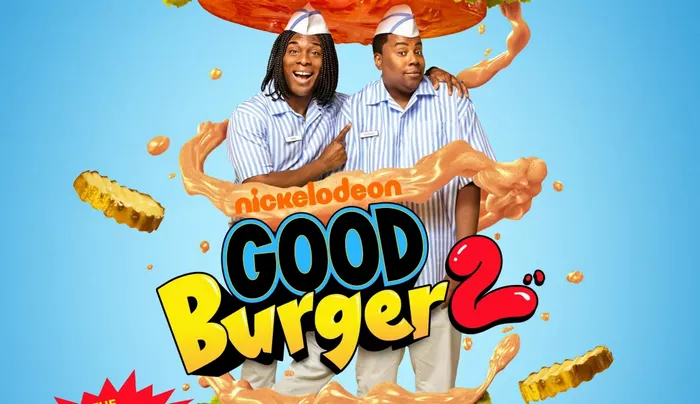In the highly anticipated sequel, Good Burger 2 takes viewers on a rollercoaster of laughs, nostalgia, and unexpected twists. As the story unfolds, the ending leaves audiences with a mix of satisfaction and curiosity. Let’s delve into the intricacies of the concluding moments, unraveling the mysteries and decoding the resolution that unfolds in the world of Ed, Dex, and the beloved Good Burger.
1. Ed’s Coding Heroics: The Ingenious Solution to Save Good Burger
At the heart of the climax in Good Burger 2 is Ed’s unexpected showcase of coding prowess. Faced with the threat of Good Burger’s closure and the loss of jobs for the beloved employees, Ed takes matters into his own hands. By reprogramming robots, he engineers a solution to not only save the iconic eatery but also to bring back the jobs that were hanging in the balance. This unexpected turn highlights Ed’s character growth and adds a layer of unexpected depth to the comedic narrative.
2. Dex’s Entrepreneurial Setback: A Humorous Twist of Fate
In a comedic twist that echoes the themes of the original Good Burger, Dex’s attempt at entrepreneurship takes an unexpected turn for the worse. After a failed stint in the business world, Dex finds himself back at Good Burger, where Ed has assumed the role of the owner. This turn of events not only adds a touch of humor but also underscores the enduring nature of Good Burger as a haven for its characters, regardless of the detours they take in their respective journeys.
3. The Corporate Menace: MegaCorp’s Threat to Good Burger
A shadow looms over the beloved Good Burger in the form of MegaCorp, a corporate entity with plans to shut down the original establishment. The motivation behind this move is to replicate the success of Good Burger without retaining the charm of its original employees. MegaCorp’s antagonistic role introduces a layer of corporate greed, pitting the underdog, Good Burger, against the juggernaut of profit-driven interests.
4. Ed’s Stand Against MegaCorp: A David-and-Goliath Showdown
As the narrative builds towards its climax, Ed emerges as an unexpected champion against MegaCorp. His coding skills, coupled with unwavering determination, position him as the unlikely hero in a David-and-Goliath-style showdown. The conflict between the grassroots charm of Good Burger and the corporate might of MegaCorp becomes a central theme, resonating with the audience’s appreciation for the underdog.
5. Good Burger’s Triumph: A Symbol of Resilience and Community
In the face of corporate threats and unforeseen challenges, Good Burger stands tall, emerging triumphant in the end. Ed’s coding wizardry not only thwarts MegaCorp’s plans but also cements Good Burger’s status as a symbol of resilience and community. The victory extends beyond the realm of fast-food business, embodying the triumph of the little guy against corporate giants—a theme that resonates with audiences of all ages.
6. Ed’s Ascension to Ownership: A Fitting and Humorous Turn
As the dust settles, the ownership dynamics at Good Burger take an unexpected yet fitting turn. Ed, with his newfound coding acclaim and unwavering dedication, assumes the role of the owner. The comedic resonance of this development adds a touch of humor to the triumphant resolution. Ed’s ascension encapsulates the theme of unexpected heroes and the enduring spirit of Good Burger.
7. The Aftermath of MegaCorp’s Defeat: Preserving the Good Burger Legacy
With MegaCorp thwarted and Good Burger standing strong, the aftermath showcases the preservation of the legacy that fans hold dear. The original employees, saved from the brink of unemployment, return to their roles, injecting the eatery with the same charm and familiarity that endeared it to audiences in the first place. Good Burger’s victory becomes a celebration of nostalgia, community, and the indomitable spirit of its quirky characters.
8. Reflecting Reality: Corporate Threats and the Fight for Authenticity
While Good Burger 2 is undoubtedly a comedic and fantastical tale, its underlying theme of corporate threats and the fight for authenticity reflects a reality familiar to many. The clash between grassroots establishments and profit-driven corporations is a narrative that resonates in various industries. Good Burger becomes a symbol for the importance of preserving authenticity in the face of looming corporate homogenization.
9. A Delayed Release: Navigating Challenges in Production
As audiences eagerly anticipate the release of Good Burger 2, the reality of delayed production becomes a noteworthy aspect of the narrative. The global challenges, likely influenced by the pandemic, have affected the timeline of the film. While this delay may test the patience of eager fans, it also underscores the dedication and commitment of the creative team to deliver a product that lives up to the expectations set by the original.
10. A Sequel’s Legacy: Balancing Nostalgia and Innovation
In conclusion, Good Burger 2’s ending encapsulates a harmonious blend of nostalgia, humor, and unexpected heroism. Ed’s coding triumph, Dex’s humorous return, and Good Burger’s victory against corporate threats weave a narrative that resonates with both longtime fans and newcomers to the franchise. As the sequel navigates the challenges of delayed production, the legacy it aims to establish hinges on the delicate balance between honoring the past and introducing fresh, innovative elements. Good Burger 2’s ending, with its twists and resolutions, serves as a testament to the enduring appeal of a fast-food joint that transcends its fictional boundaries to become a cultural touchstone.

